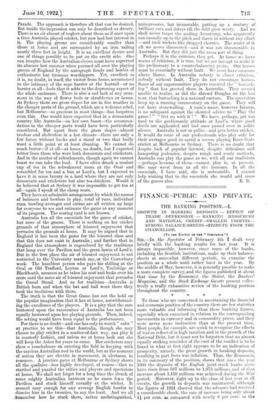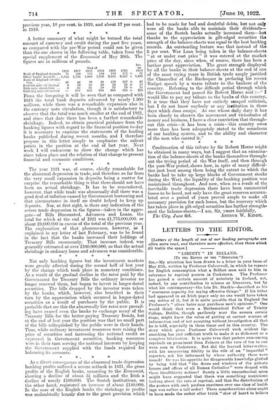FINANCE—PUBLIC AND PRIVATE.
THE BANKING POSITION.—I.
GROWTH IN BANKING DEPOSITS — EFFECT OF TRADE DEPRESSION — BANKING RESOURCES AND NATIONAL CREDIT—SMALLER PROFITS— STRONG BALANCE-SHEETS—TRIBUTE FROM THE CHANCELLOR.
[To u Eprron. or Tim " SPICRATOa."] Sra,—In the Spectator of February 4th I dealt very briefly with the banking results for last year. It is always impossible, however, since some of the banks, including the Scottish institutions, make up their balance- sheets at somewhat different periods, to examine the position as a whole until rather later in the year. By the middle of May, however, it is generally possible to make a more complete survey, and the figures published at about that time by the Economist, the Statist, the Bankers' Magazine, and the Stock Exchange Gazette present collec- tively a really exhaustive review of the banking position throughout the country.
To those who are concerned in ascertaining the financial and economic position of the country there are few statistics more valuable and informing than these banking figures, especially when examined in relation to the corresponding movements in currency and in commodity prices, and they were never more instructive than at the present time. Most people, for example, are quick to recognize the effects of war as reflected in high taxation and in the growth of the National Debt, but it must not be forgotten that an almost equally striking reminder of the cost of the conflict is to be found in what at first sight appears to be an indication of prosperity, namely, the great growth in banking deposits, resulting in part from war inflation. Thus, the Economist, in its summary of the position; shows that since the year 1900 the deposits of the English joint-stock banks alone have risen from 587 millions to 1,975 millions, and of that increase about 1,150 millions was achieved during the War period. Moreover, right up to the close of last year at all events, the growth in deposits was maintained, although the figures of 1921 showed that the advance had received a considerable check, the rate of increase being only about 11 per cent. as compared with nearly 6 per cent. in the previous year, 18 per cent. in 1919, and about 17 per cent. in 1918.
A better summary of what might be termed the total amount of currency and credit during the past five years, as compared with the pre-War period. could not be given than the one shown in the following table, taken from the special supplement of the Economist of May 20th. The figures are in millions of pounds.
Inc.
End of on
1913 1917 1918 1919 1920
1921
1913 Bank of England deposits 71 166 172 199 189 122 + 51 Other banks' deposits .. 1,032 1,706 1,988 2;356 2,492 2,527
1,495 Bank of England circula- tion .. 30 46 70 91 133 127 4- 97 Scottish note (imitation 8 19 25 28 29 25 -I- 17 Irish note circulation .. 8 22 31 29 25 19 4- 11 Currency note circulation — 213 323 356 868 326
326
From the foregoing it will be seen that as compared with 1913 the total bank deposits advanced by nearly 1.500 millions, while there was a remarkable expansion also in the currency note circulation, though it is satisfactory to observe that the total was much smaller at the end of 1921, and since that date there •has been a further remarkable shrinkage. Indeed, to obtain practical guidance from the banking figures with regard to the financial position to-day it is necessary to examine the statements of the leading banks published during recent months, and I therefore propose in this letter simply to emphasize the salient points in the position at the end of last year. Next week I will endeavour to show the change which has since taken place and the relation of that change to present financial and economic conditions.
* * * * The year 1921 was, of course, chiefly remarkable for the abnormal depression in trade, and therefore, so far from the very small expansion in deposits being a matter for surprise the remarkable thing is that there should not have been an actual shrinkage. It has to be remembered, however, that while trade was abnormally dull there was a good deal of inflation caused by Government,borrowing and that circumstance in itself no doubt helped to keep up deposits. Nar, at first sight, is there any indication of the severe trade depression in the figures—taken in the aggre- gate of Bills Discounted, Advances and Loans, the total for which at the end of 1921 was £1,775,000,000, or about £9,000,000 in excess of the total of the previous year. The explanation of that phenomenon, however, as I explained in my letter of last February, was to be found in the fact that the banks increased their holdings of Treasury Bills enormously. That increase. indeed, was generally estimated at over £100,000,000, so that the actual shrinkage in ordinary loans and advances was considerable.
Not only banking figures but the investment markets were greatly affected during the second half of last year by the change which took place in monetary conditions. As a result of the gradual decline in the rates paid by the Government for Treasury Bills the ordinary investor no longer renewed them, but began to invest in longer-dated securities. The bills dropped by the investor were taken by the banks, which, however, also benefited in their turn by the appreciation which occurred in longer-dated securities as a result of purchases by the public. It is probable that ere this the abnormally low rates now prevail- ing have caused even the banks to exchange many of the Treasury Bills for the better-paying Treasury Bonds, but at the end of last year the position was that no small part of the bills relinquished by the public were in their hands. Thus, while ordinary investment resources were raising the price of securities and increasing the national credit as expressed in Government securities, banking resources were in their turn serving the national interests by keeping the Government supplied with the funds required for balancing its accounts.
* Asa direct consequence of the abnormal trade depression banking profits suffered a severe setback in 1921, the gross profits of the English banks, according to the Economist, showing a decline of about 3i millions and the Irish a decline of nearly £100,000. The Scotch institutions, on the other hand, registered an increase of about £140,000. In the case of the English banks the shrinkage in profits was undoubtedly largely due to the great provision which had to be made for bad and doubtful debts, but not only were all the banks able to maintain their dividends—. some of the Scotch banks actually increased them—but thanks to the appreciation in gilt-edged securities the strength of the balance-sheets was equal to the best bankin,0 records. An outstanding feature was that instead of the 5 per cent. War Loan being taken in the balance-sheets " at or under cost price " it was entered at the market price of the day, since when, of course, there has been a further great appreciation. The great strength displayed by all the banks in their balance-sheets at the end of one of the most trying years in British trade amply justified the Chancellor of the Exchequer in prefacing his recent Budget speech by a warm tribute to the bankers of the country. Referring to the difficult period through which the Government had passed Sir Robert Home said :—" I would like to pay my tribute to the banks of this country. It is true that they have not entirely escaped criticism, but I do not know anybody or any institution in these days which does escape. As one whose daily, duty it has been closely to observe the movement and vicissitudes of money and business, I have a clear conviction that through- out this crisis—it has been a crisis—this country owes more than has been adequately stated to the soundness of our banking system, and to the ability and character of the men who control it."
Confirmation of this tribute by Sir Robert Home might be obtained in many ways, but I suggest that an examina- tion of the balance-sheets of the banks themselves through- out the trying period of the War itself, and then through the post-War period, shows how, in spite of many difficul- ties (not least among them being the extent to which the banks had to take up large blocks of Government stocks during the War), the liquidity of the banking position was maintained throughout. And now, when as a result of the inevitable trade depression there have been commercial losses to be faced, not only have the great reserves accumu- lated over a period of years proved ample to make all necessary provision for such losses, but the recovery which has taken place in gilt-edged securities has further strength- ened the balance-sheets.—I am, Sir, yours faithfully,



































 Previous page
Previous page